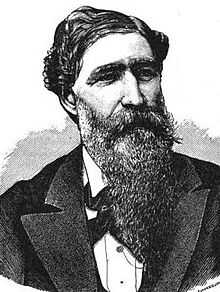William C. Duncan
| William C. Duncan | |
|---|---|
 | |
| Mayor of Detroit | |
| In office 1862–1863 | |
| Preceded by | Christian H. Buhl |
| Succeeded by | Kirkland C. Barker |
| Personal details | |
| Born | May 18, 1820 Lyons, New York |
| Died | December 19, 1877 Detroit, Michigan |
William Chamberlain Duncan (May 18, 1820 – December 19, 1877) was a brewer, politician, and mayor of Detroit, Michigan.
Life and politics
Duncan was born in Lyons, New York on May 18, 1820.[1] The family moved to Rochester, New York in 1825, and in 1841 Duncan began working as a steward[2] on the passenger steamers crossing the Great Lakes. In 1846, he changed employers and began working on a steamer traveling through Lake Superior.[2] In 1849, Duncan moved to Detroit and became a brewer.[1]
Duncan was a Democrat,[2] and in 1852, he was elected an alderman, serving five years. He was first council president, after a revision of the city charter created that position.[2] He was mayor of Detroit for two years, 1862 and 1863, and in the fall of 1863 was elected a state senator.[1] He began in the banking business in 1865, but soon gave up the trade due to impaired health[2] and to take care of the property he had accumulated and to visit Europe.[1]
In 1873, however, Duncan was chosen as a member of the newly created Board of Estimates.[2] In the same year, the city Democratic Party asked him to again be their candidate for mayor, but Duncan declined due to his ill-health.[2]
William C. Duncan died on December 19, 1877; he had no children.[1]
References
- ↑ 1.0 1.1 1.2 1.3 1.4 Silas Farmer (1889), THE HISTORY OF DETROIT AND MICHIGAN, p. 1044
- ↑ 2.0 2.1 2.2 2.3 2.4 2.5 2.6 Charles Richard Tuttle, General history of the state of Michigan: with biographical sketches, portrait engravings, and numerous illustrations. A complete history of the Peninsular state from its earliest settlement to the present time, R. D. S. Tyler & co. date =1874, pp. 714–716
| Political offices | ||
|---|---|---|
| Preceded by Christian H. Buhl |
Mayor of Detroit 1862 - 1863 |
Succeeded by Kirkland C. Barker |
